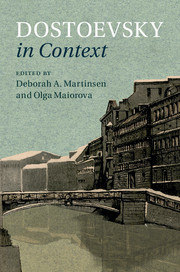Book contents
- Frontmatter
- Contents
- List of illustrations
- Notes on contributors
- Acknowledgments
- Note on citation, transliteration, glossary, and dates
- Chronology
- 1 Introduction: the many worlds of Dostoevsky
- PART I SOCIAL, HISTORICAL, AND CULTURAL CONTEXTS
- i CHANGING POLITICAL, ECONOMIC, AND SOCIAL LANDSCAPE
- ii POLITICAL, SOCIAL, AND CULTURAL INSTITUTIONS
- 9 Russian monarchy and the people
- 10 Empire
- 11 Service ranks
- 12 Education
- 13 Science, technology, and medicine
- 14 Jews, race, and biology
- 15 Suicide
- 16 Children
- 17 Gambling
- iii SPACE AND PLACE
- iv RELIGION AND MODERNITY
- PART II LITERATURE, JOURNALISM, AND LANGUAGES
- Glossary
- Further reading
- Index
- References
10 - Empire
from ii - POLITICAL, SOCIAL, AND CULTURAL INSTITUTIONS
Published online by Cambridge University Press: 18 December 2015
- Frontmatter
- Contents
- List of illustrations
- Notes on contributors
- Acknowledgments
- Note on citation, transliteration, glossary, and dates
- Chronology
- 1 Introduction: the many worlds of Dostoevsky
- PART I SOCIAL, HISTORICAL, AND CULTURAL CONTEXTS
- i CHANGING POLITICAL, ECONOMIC, AND SOCIAL LANDSCAPE
- ii POLITICAL, SOCIAL, AND CULTURAL INSTITUTIONS
- 9 Russian monarchy and the people
- 10 Empire
- 11 Service ranks
- 12 Education
- 13 Science, technology, and medicine
- 14 Jews, race, and biology
- 15 Suicide
- 16 Children
- 17 Gambling
- iii SPACE AND PLACE
- iv RELIGION AND MODERNITY
- PART II LITERATURE, JOURNALISM, AND LANGUAGES
- Glossary
- Further reading
- Index
- References
Summary
By the year Dostoevsky was born (1821), Russia had evolved into a vast continental empire characterized by its great ethnic, religious, socioeconomic, and geographical diversity. Stretching from Eastern Europe to the Pacific, it encompassed a huge array of peoples – from settled agrarian societies to nomadic tribes, from Muslims to Buddhists to shamanists. Its centuries-long imperial quest established Russia as the dominant power in Eurasia. Each newly incorporated land enabled – and often made strategically imperative – further conquest. Many Russians – not only tsars and military commanders, but also great writers, like Alexander Pushkin and Fyodor Dostoevsky – enthusiastically embraced the state's imperial project. For generations of Russians, national pride hinged on their empire's vastness, diversity, and endless expansion.
Empire-building was not only history for Dostoevsky and his contemporaries, it was the reality in which they lived. The war in the Caucasus (1817–64), the annexation of the Amur River (1858–60), and the piecemeal conquest of Central Asia (1865–95), all key imperial endeavors of Dostoevsky's time, had a huge impact on Russian life. Myriad Russians went to the borderlands to interact with indigenous ethnic groups, and many writers traveled there to produce works about the exotic periphery. Dostoevsky, residing most of his life in St. Petersburg, witnessed this expansion from the center and, at the beginning of his literary career, took Russia's imperial identity for granted. But empire gradually figured more prominently in his work: the ongoing empire-building process piqued his imagination and formed the heart of his most cherished beliefs about Russia's destiny and the future of all mankind.
Revolutionary imperialism
One can trace the first seeds of the mature Dostoevsky's conception of Russia's empire back to the major intellectual encounters of his youth. In the 1840s he aligned himself, though not unreservedly, with the Westernizers* – a group that urged Russia to emulate Western European civic institutions. The Westernizers embraced a Hegelian notion of the modern state capable of promoting civic development, and they admired Peter the Great (1682–1725) for modernizing Russia. Vissarion Belinsky, a leading Westernizer and the most prominent literary critic of the day, saw the empire as the defining context for national development, including literature. Like many of his contemporaries, he believed in Russia's civilizing mission and affirmed its sense of superiority over its colonial subjects.
- Type
- Chapter
- Information
- Dostoevsky in Context , pp. 86 - 97Publisher: Cambridge University PressPrint publication year: 2016

